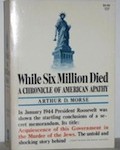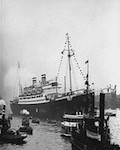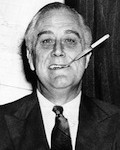By the time he was 26, Jan Karski had been imprisoned by the Soviets, tortured by the Gestapo, and nearly drowned while escaping from a hospital in German-occupied Slovakia. Had he chosen then to end his service in the World War II-era Polish underground, few would have challenged his decision. Instead, he accepted a hazardous mission to bring news about Hitler’s mass murder of European Jewry to the outside world.
Karski, a Polish Catholic, was smuggled into the Warsaw Ghetto in 1942, as the Nazis were deporting hundreds of thousands of Warsaw’s Jews to the gas chambers of Treblinka. Walking through the ghetto, he saw corpses piled in the gutter, emaciated children clothed in rags, dazed men and women slumped against decrepit buildings.
At one point, gunfire erupted and Karski’s comrades pulled him into a nearby apartment. He saw two uniformed teenagers with pistols in the street. “They are here for the ‘Jew hunt’,” Karski was told. For sport, Hitler Youth members would venture into the Jewish part of the city and shoot people at random.
Days later, Karski and a compatriot, disguised as Ukrainian militiamen, took a six-hour train ride to a site in southeastern Poland called Izbica. It was a “sorting station”–when Jews were shipped to a death camp, Karski learned, the Germans would first take them to Izbica, rob them of their last belongings, and then send them off to the gas chambers.
Karski traveled by train across occupied Belgium, Germany, and France. Thanks to an injection from a sympathetic dentist that swelled his jaw, Karski was able to avoid conversation that might have revealed his Polish identity. He hiked across the Pyrenees mountains into Spain, and from there traveled to London.
Karski was able to secure a meeting with British Foreign Minister Anthony Eden, but Eden showed little interest in Karski’s account of the slaughter of the Jews. The prime minister, Winston Churchill, was said to be too busy to see him at all. Karski did succeed in generating a number of sympathetic reports in the British press and BBC Radio.
Karski arrived in the United States in July 1943. One of his first meetings was with Supreme Court Justice Felix Frankfurter. Karski described the Warsaw Ghetto, the Izbica transit station, and the systematic annihilation of European Jewry. Frankfurter responded, “I am unable to believe you.”
On July 28, the Polish courier met with President Franklin D. Roosevelt, in the Oval Office, for more than an hour. Karski began by describing the activities of the Polish underground. The president listened with fascination, asked questions, and offered unsolicited advice, some of it a bit eccentric–such as his idea of putting skis on small airplanes to fly underground messengers between England and Poland during the winter. But when Karski related details of the mass killings of the Jews, FDR had nothing to say. The president was, as Karski politely put it, “rather noncommittal.”
At a White House ceremony in May 2012, Karski was posthumously awarded a Presidential Medal of Freedom by President Barack Obama, who praised him for speaking out at time when “so many others stood silent.”
Sources: Wood and Jankowski, Karski, pp.187-202;
Engel, Jan Karski’s Mission to the West, pp.369-372.











